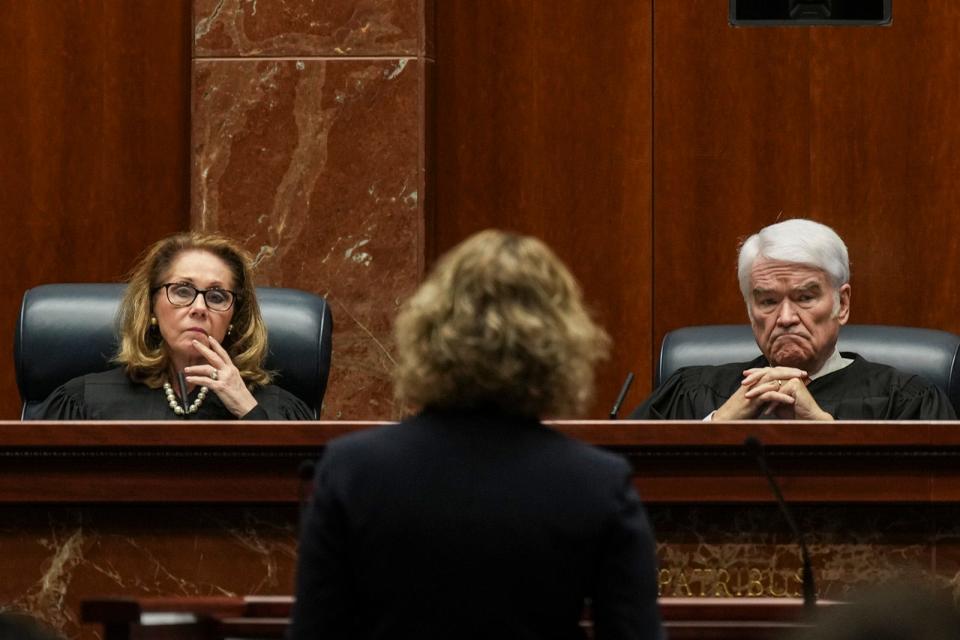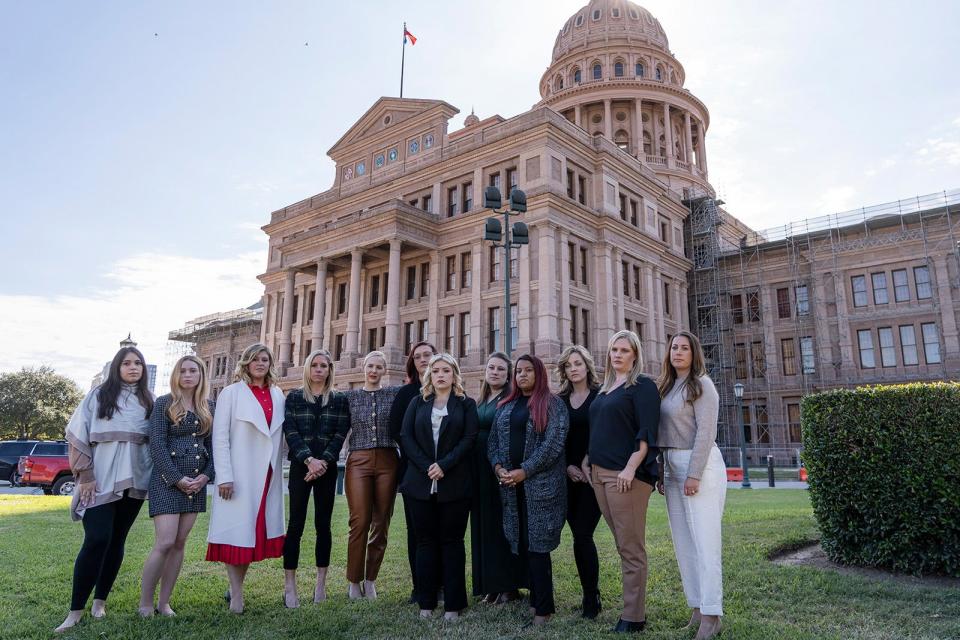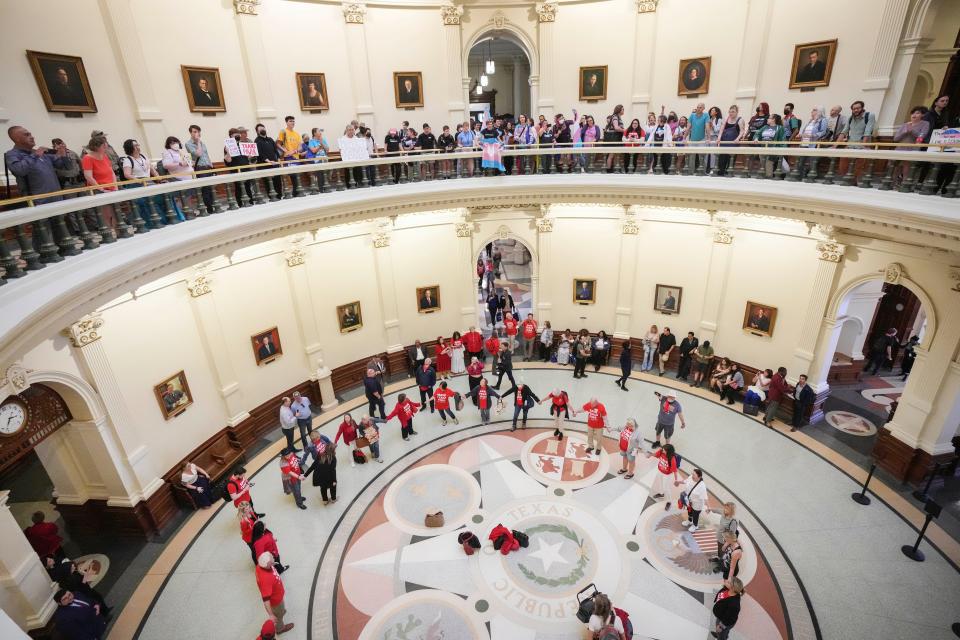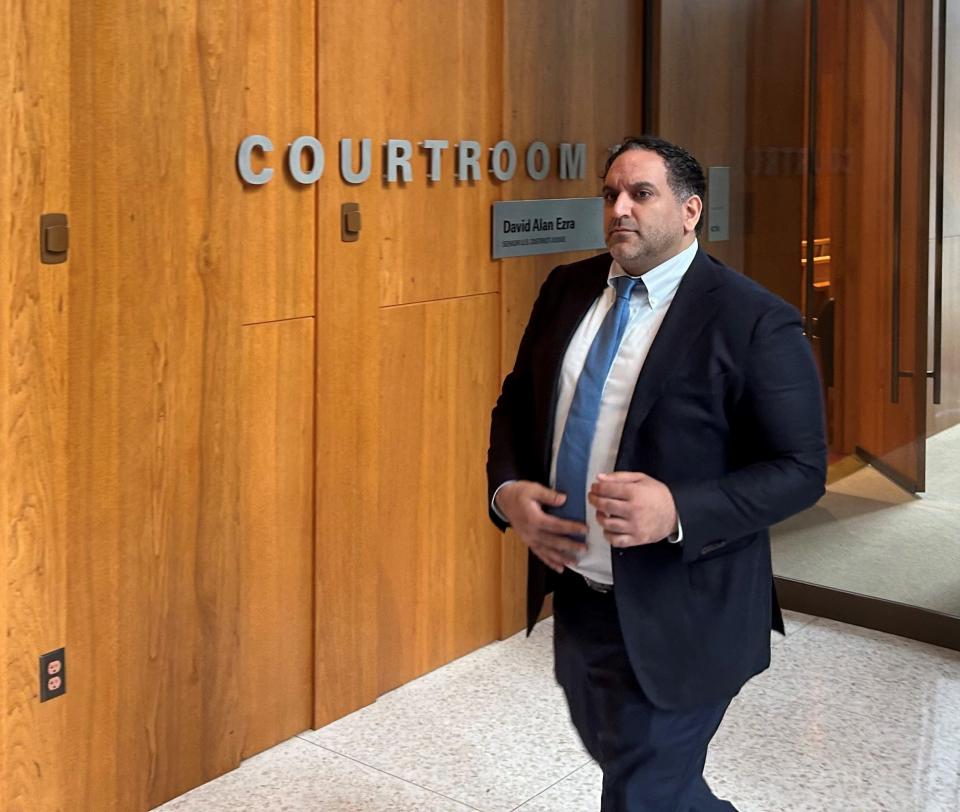From abortion ban to local elections, here's a look at Texas Supreme Court rulings this year
- Oops!Something went wrong.Please try again later.
- Oops!Something went wrong.Please try again later.
The final arbiter of all civil matters in the state, the Texas Supreme Court, issued rulings in several cases this year ranging from what medical treatments can be performed on children in Texas to who should oversee local elections in certain counties.
While the high court rejects weighing in on most cases put before it, each year the nine justices are tasked with issuing sweeping decisions, as per its interpretation of the state constitution, in matters that deal with everything from family disputes to clarifying business contracts.
The following is a look at a few cases the Texas Supreme Court has decided so far this year. The court has a slate of future oral arguments set on its docket in September and October.

Texas abortion ban clarifications
Since Texas enacted one of the nation's strictest abortion bans in 2021, the state's Supreme Court has been tapped to clarify and even consider overturning the law.
Having previously rejected an appeal by Kate Cox, a mother of two from Dallas who was carrying a fatally ill fetus and sought the court's intervention last year to terminate her pregnancy, the state's high court again ruled to keep the abortion ban in place in May, siding against 20 women who were unable to receive emergency abortions.

Texas law prohibits abortions except when a pregnant patient has a "life-threatening condition," the state Supreme Court has affirmed in its recent decisions. The ban, which vaulted to the national stage with Cox attending the State of the Union address in March as a guest of President Joe Biden, remains active after the court's deliberation in May.
The Texas Medical Board, a governor-appointed board tasked with overseeing the practice of medicine and licensing of physicians in the state, has adopted several new rules tied to abortion in June, including a clarification that a patient need not face "imminent" death before they can qualify for an emergency abortion.
Prohibition on gender-affirming care
In the wake of one of the biggest state legislative battles last year, the Texas Supreme Court in June upheld the provisions of Senate Bill 14, which prohibits certain gender-affirming medical treatments for minors.
In a nearly unanimous decision, the court rejected an appeal from parents, physicians and advocacy groups that sought to have the new law tossed out for being an unconstitutional infringement on parents' rights to seek medical care for their children.

While the court acknowledged the rights of parents, its ruling not only upheld SB 14 but also reaffirmed the Legislature's right and standing to determine what medical treatments are allowed to be performed in Texas.
SB 14 prohibits gender modification surgeries for minors as well as the prescription of "puberty blockers," or medications meant to affect the developments that occur during puberty.
In a dissenting opinion, Justice Debra Lehrmann expressed reservations about the state's foray into parental rights and the potential issues that could arise in the future by usurping the purview of parents.
"The law is not only cruel—it is unconstitutional," Lehrmann wrote.
Paxton continues fight against "apex" depositions
After a Travis County state District Court judge ruled in January that Attorney General Ken Paxton and three of his top deputies must testify under oath in the long-running wrongful termination lawsuit brought by four former agency officials, Paxton immediately appealed the case to the state Supreme Court.
Still pending before the court, Paxton's appeal over his deposition has ground the 4-year-old case to a halt as arguments continue over Paxton's obligation to testify on the situation that resulted in his former, handpicked deputies leaving the office and reporting allegations of misconduct against Paxton to the FBI.
Willing to accept a final judgment in the case, Paxton has argued in multiple court filings that the proceedings should already have ended and that as an executive official he is immune from testifying on matters that fall under his office.
Attorneys for the whistleblowers have consistently rebuffed Paxton's immunity claims as being a threat to public accountability and having a chilling effect for future whistleblowers, also pointing to Paxton's effort to see the case end without further testimony or a trial as disingenuous.
After the most recent round of requested legal filings were presented to the court in June, it remains unclear when the nine-member bench will issue a decision on Paxton's sworn testimony.
Nate Paul stays out of jail for now
Found in contempt of court, Nate Paul, a former Austin real estate developer and Paxton ally, made an appeal to the Supreme Court in March to prevent an ordered 10-day jail stint.
In a long-running case in which he is accused of defrauding a nonprofit in Travis County, Paul faces six counts of criminal contempt for a "continuous refusal" to follow the parameters of an injunction that required him to report his monthly financial exchanges.

An original criminal contempt order by Travis County state District Judge Jan Soifer was upheld by the Supreme Court in a 5-4 decision in March, but the subsequent 10-day sentence was again delayed by Paul's current appeal protesting the sentence as an unlawful detention.
Before the court accepted Paul's emergency appeal, he was ordered to appear at the Travis County Correctional Center by April 1. A final decision on the current appeal remains pending before the court.
Senate Bill 1750 clears challenge
Flying under the radar as other election-related bills were debated during the 2023 legislative session, Senate Bill 1750 abolished Harris County's chief elections administrator position.
More: Texas Supreme Court sides with state regulators on $16 billion winter storm overcharges
The law, which requires all election duties to return to the purview of the county's clerk and tax assessor-collector, survived an initial challenge in front of the Supreme Court last year, allowing it to take effect before the most recent election cycle.
Despite protests from Harris County and Houston officials, the challenge to the law was shelved from the court's docket late last year after oral arguments. In February, the court officially tossed the challenge to the law as moot.
What's next for the Texas Supreme Court?
Currently, there are two dozen cases set for oral arguments before the Supreme Court in September and October.
The wide-ranging docket includes a dispute between the Save Our Springs Alliance and the Texas Commission on Environmental Quality over water quality regulations and a reprimand against First Assistant Attorney General Brent Webster.
Webster faces an official complaint from the Commission for Lawyer Discipline, a standing committee of the State Bar of Texas, seeking to reprimand him for a "dishonest" attempt to prevent the certification of 2020 election results in Pennsylvania, Wisconsin, Georgia and Michigan that were favorable to President Joe Biden.
In April, 18 attorneys general filed a friend-of-the-court brief in Webster's support, arguing that allowing for the punishment would be an intrusion into prosecutorial discretion.
In a parallel case also before the state Supreme Court, Paxton, the state's top attorney, faces similar allegations. In June, Paxton filed a request to the high court to reconsider a lower court's previous ruling that advanced a disciplinary case against him for his effort to overturn the results of the 2020 presidential election.
Oral arguments for Webster's reprimand case are set for Sept. 12.
This article originally appeared on Austin American-Statesman: What has the Texas Supreme Court done in 2024? Here are few rulings.

